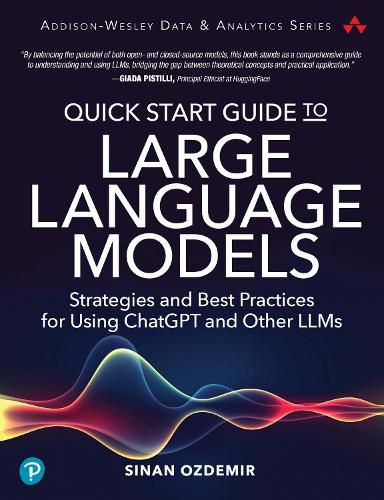Readings Newsletter
Become a Readings Member to make your shopping experience even easier.
Sign in or sign up for free!
You’re not far away from qualifying for FREE standard shipping within Australia
You’ve qualified for FREE standard shipping within Australia
The cart is loading…






The Practical, Step-by-Step Guide to Using LLMs at Scale in Projects and Products
Large Language Models (LLMs) like ChatGPT are demonstrating breathtaking capabilities, but their size and complexity have deterred many practitioners from applying them. In Quick Start Guide to Large Language Models, pioneering data scientist and AI entrepreneur Sinan Ozdemir clears away those obstacles and provides a guide to working with, integrating, and deploying LLMs to solve practical problems.
Ozdemir brings together all you need to get started, even if you have no direct experience with LLMs: step-by-step instructions, best practices, real-world case studies, hands-on exercises, and more. Along the way, he shares insights into LLMs' inner workings to help you optimize model choice, data formats, parameters, and performance. You'll find even more resources on the companion website, including sample datasets and code for working with open- and closed-source LLMs such as those from OpenAI (GPT-4 and ChatGPT), Google (BERT, T5, and Bard), EleutherAI (GPT-J and GPT-Neo), Cohere (the Command family), and Meta (BART and the LLaMA family).
Learn key concepts: pre-training, transfer learning, fine-tuning, attention, embeddings, tokenization, and more Use APIs and Python to fine-tune and customize LLMs for your requirements Build a complete neural/semantic information retrieval system and attach to conversational LLMs for retrieval-augmented generation Master advanced prompt engineering techniques like output structuring, chain-ofthought, and semantic few-shot prompting Customize LLM embeddings to build a complete recommendation engine from scratch with user data Construct and fine-tune multimodal Transformer architectures using opensource LLMs Align LLMs using Reinforcement Learning from Human and AI Feedback (RLHF/RLAIF) Deploy prompts and custom fine-tuned LLMs to the cloud with scalability and evaluation pipelines in mind
"By balancing the potential of both open- and closed-source models, Quick Start Guide to Large Language Models stands as a comprehensive guide to understanding and using LLMs, bridging the gap between theoretical concepts and practical application." --Giada Pistilli, Principal Ethicist at HuggingFace
"A refreshing and inspiring resource. Jam-packed with practical guidance and clear explanations that leave you smarter about this incredible new field." --Pete Huang, author of The Neuron
Register your book for convenient access to downloads, updates, and/or corrections as they become available. See inside book for details.
$9.00 standard shipping within Australia
FREE standard shipping within Australia for orders over $100.00
Express & International shipping calculated at checkout
The Practical, Step-by-Step Guide to Using LLMs at Scale in Projects and Products
Large Language Models (LLMs) like ChatGPT are demonstrating breathtaking capabilities, but their size and complexity have deterred many practitioners from applying them. In Quick Start Guide to Large Language Models, pioneering data scientist and AI entrepreneur Sinan Ozdemir clears away those obstacles and provides a guide to working with, integrating, and deploying LLMs to solve practical problems.
Ozdemir brings together all you need to get started, even if you have no direct experience with LLMs: step-by-step instructions, best practices, real-world case studies, hands-on exercises, and more. Along the way, he shares insights into LLMs' inner workings to help you optimize model choice, data formats, parameters, and performance. You'll find even more resources on the companion website, including sample datasets and code for working with open- and closed-source LLMs such as those from OpenAI (GPT-4 and ChatGPT), Google (BERT, T5, and Bard), EleutherAI (GPT-J and GPT-Neo), Cohere (the Command family), and Meta (BART and the LLaMA family).
Learn key concepts: pre-training, transfer learning, fine-tuning, attention, embeddings, tokenization, and more Use APIs and Python to fine-tune and customize LLMs for your requirements Build a complete neural/semantic information retrieval system and attach to conversational LLMs for retrieval-augmented generation Master advanced prompt engineering techniques like output structuring, chain-ofthought, and semantic few-shot prompting Customize LLM embeddings to build a complete recommendation engine from scratch with user data Construct and fine-tune multimodal Transformer architectures using opensource LLMs Align LLMs using Reinforcement Learning from Human and AI Feedback (RLHF/RLAIF) Deploy prompts and custom fine-tuned LLMs to the cloud with scalability and evaluation pipelines in mind
"By balancing the potential of both open- and closed-source models, Quick Start Guide to Large Language Models stands as a comprehensive guide to understanding and using LLMs, bridging the gap between theoretical concepts and practical application." --Giada Pistilli, Principal Ethicist at HuggingFace
"A refreshing and inspiring resource. Jam-packed with practical guidance and clear explanations that leave you smarter about this incredible new field." --Pete Huang, author of The Neuron
Register your book for convenient access to downloads, updates, and/or corrections as they become available. See inside book for details.